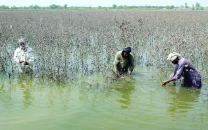Polio recurrence: Lifelong cost of a 10-year war
Security problems in Fata, K-P make it difficult to conduct vaccinations.

The Afghan war has left some of Pakistan’s children crippled for life. Militancy in areas bordering Afghanistan is said to be one of the prime reasons behind the alarming rise of polio cases in the country.
“Security problems in parts of the Federally Administered Tribal Areas (Fata) and remote areas of Balochistan and Khyber-Pakhtunkhwa have made it very difficult to conduct vaccination programmes,” said Muhammad Zahid Elahi, an analyst on governance and Fata affairs.
Mistrust between the state and the citizens is another reason for the increase of polio in these areas, he added. “The same mistrust was apparent in these parts of the country when the government introduced iodized salt to combat iodine deficiency diseases. People were reluctant to use the salt as they suspected it as a government ploy to implement family planning,” he said.
“People who do not have gas, oil, electricity and other essential goods because of poor governance, are not willing to accept that the same government will save them from disease without vested interests,” he said.
“The government will have to demonstrate that it is sincere in wanting to eradicate polio,” Elahi added.
“The world is perturbed over the situation in Pakistan,” said Najeeb Durrani, a surveillance coordinator at the Health Department (Islamabad).
“As long as even one child remains infected, all countries are at risk of contracting polio,” he said, quoting the World Health Organization’s (WHO) motto. The organisation has painted a gloomy picture of the state of the polio eradication programmes in Pakistan.
Polio (also called poliomyelitis) is highly infectious and affects the nervous system, sometimes resulting in paralysis.
According to a report by the National Institute of Health, 173 cases of polio had been reported in Pakistan until December 18 this year, while 144 were reported in 2010 and 116 in 2009.
The highest number of polio cases has been reported in Balochistan (68), Fata (50), Sindh (30), Khyber-Pakhtunkhwa (19), Punjab (5) and one from Gilgit-Baltistan, according to the report.
Polio has also spread to neighbouring China for the first time since 1999, according to the World Health Organization (WHO). According to the WHO, a strain of polio (WPV1) found in China was genetically linked with the type now circulating in Pakistan. After 10 cases of polio were reported in the western province of Xinjiang, a mass vaccination programme has started in the country.
Published in The Express Tribune, December 25th, 2011.



















COMMENTS
Comments are moderated and generally will be posted if they are on-topic and not abusive.
For more information, please see our Comments FAQ